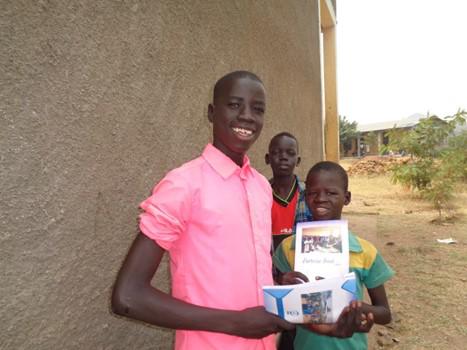Education Can Make The Future

Bordering South Sudan to the west, Ethiopia’s Gambella Region has housed the Tierkidi Refugee Camp since February 2014, where, according to UNHCR, an estimated 64,000 people live, having fled conflict and insecurity. Though Tierkidi’s refugee population spans the spectrum of age and disposition, children under the age of 18 comprise a clear majority at 65 per cent.
The second of 5 children, Duer Reath, a 14-year-old boy originally from Mathiang, South Sudan has lived in Tierkidi with his mother and siblings since 2015. Duer and his family took flight from their home in Mathiang when he was just 7 years old because of the violence. At that time, he was in the middle of class 2.
Recounting how he came to be a refugee in Tierkidi, Duer states,
“It has been seven years since we came here.... My father is now living in South Sudan as a soldier…. Before the conflict broke out, he was a government employee. My mother was a house maid. But, as a result of the war, my family is separated and we had to leave all things behind in Mathiang. My family and I left with only the clothes on our back.”
Crossing vast stretches of South Sudan into Gambella was not easy. Upon arrival at the camp, there was a necessary period of adjustment – living as a refugee in Ethiopia was quite different from the life he was forced to leave behind. Duer recalls when his family was admitted to Tierkidi receiving some basic necessities, such as WASH items, and trying to regain a sense of normalcy by going back to school. Initially, he entered class 1 and made his way through the ranks, reaching class 6 before he ended up dropping out of school altogether, due to issues at home. Duer, as one of the elder children in the family, especially with his father being in South Sudan, was expected to take on larger shares of responsibility at home and look after his younger siblings. These were unpleasant days for young Duer; he would often wander about the camp, attempting to get food rations or doing different chores to help support his family. He missed education. In total, Duer was out of school for about a year.
Fortunately, one day, Duer was identified as an OOSC during a door-to-door home visit by project staff, as part of the joint initiative, “Increased Access to Quality Basic Education for OOSC in Gambella” between Save the Children and Educate A Child, a global programme of the Education Above All Foundation. Heaven Dilgasu, the staff, who found Duer, managed to persuade the boy’s family to re-enrol him in school by explaining the long-term value of education. Dilgasu asserts that the home visits are “important” because they give the project team a picture of the refugee children who are going to school and those who are not. They also provide an opportunity to follow up with interviews and discussions with families and villagers, which, in turn, encourage families to send their children to class, as was the case with Duer. It worked.
Today, Duer is back in education. To boot, he is an outstanding student. Khan Lok, one of Duer’s teachers, describes him as “capable, clever, and humble.” His family welcomes Duer’s re-enrolment and with their support, the sky appears to be the limit. Duer is currently in class 8, his favourite subject is physics, and he figures among the top three students in his grade level!
Looking to the future, Duer says, “I have a great hope to be an engineer when I complete my education. I also want to go back to my country and help for the reconstruction of my hometown, Mathiang.” In addition, he hopes that the situation there will change and the children will be able to continue their education remarking, “… education is so important for all children. Education can make the future…”
 Ethiopia
Ethiopia